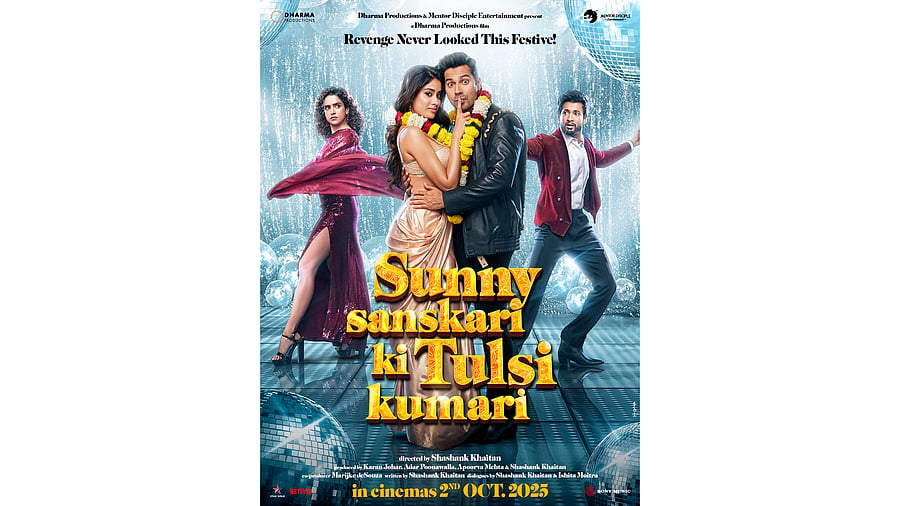
'Sunny Sanskari Ki Tulsi Kumari' movie review
Credit: X/Dharma Productions
“Sunny Sanskari Ki Tulsi Kumari” — SSKTK in the tradition that turned 1988’s “Qayamat Se Qayamat Tak into QSQT — is most of what the trailer promised, and not much more. Shashank Kahitan returns with what can easily be surmised to be the latest addition to the “X Ki Y” franchise. After all, he also helmed “Humpty Sharma Ki Dulhania” and “Badrinath Ki Dulhania”.
One may cheekily point out that he was also one of the writers of “Rocky Aur Rani Ki Prem Kahani” (2023). For it, he shared writing credits with Ishita Moitra and Sumit Roy. Moitra, it may be mentioned, returns to share those credits for SSKTK.
In those roles, they seem to be deserving of most of the credit for SSKTK turning out to be a generally fun caper, even though some scenes evoke secondhand cringe. Overall, SSKTK is about as much of a popcorn-muncher as Humpty and Badri’s outings.
On the screen
SSKTK’s lead pairing of Varun and Jahnvi comes off as fresh. However, their acting is only one factor contributing to that. The rest of the cast seems to have been deliberately depopulated of anyone who could draw eyeballs, which is why Varun Dhawan hamming it up in places as Delhi boy Sunny Sanskari comes off as passable but affable.
The true improvement, however, comes from Jahnvi Kapoor, who appears to have honed her skills to the extent that her depiction of Tulsi Kumari is more believable as the cute schoolteacher who transforms into a glam queen trying to win back her ex. However, she still risks being pigeonholed into only these roles by directors looking to bank on her. A glaring indication of this is a song sequence where her midriff has more illumination than her face. However, this overt sexualisation is thankfully absent in several other places where it could have been shoehorned in.
As for the remainder of the cast, Rohit Saraf and Sanya Malhotra, in particular, have significantly lower screen time than they should, given their relevance to the story. In fact, scenes apparently featuring them are often from their point of view, which means that we see the back of their or someone else’s heads while Varun and Jahnvi get more time to have their faces depicted in varying degrees of close-up.
Of the other characters, Abhinav Sharma’s Buntu and Maniesh Paul’s Kuku do play the perfect trampolines for the leads to bounce off, but their unidimensional characterisation — thanks in some part to those behind the screen — does not do justice to what these characters could have become.
Actors like Rohitash Gaud are painfully underused. Dharna Durga as Tulsi’s friend Dharna leaves the viewer asking for more, but the makers were seemingly not in the mood. Hence, she is limited to less than a third of the first half.
Behind the scenes
On the face of it, SSKTK plays out almost along predicted lines. Then again, not much different could have been done — especially for a mainstream film with blockbuster ambitions — with a story inspired by Julia Roberts-starrer “My Best Friend’s Wedding” (1997), which gained global attention and spawned 2002’s “Mere Yaar Ki Shaadi Hai”, with a major change in the climax to make it more palatable to Indian viewers.
It may be noted that Khaitan made similar changes when he adapted Nagraj Manjule’s critical-commercial hit “Sairat” into “Dhadak” (2018): He glossed over, altered, and in some places entirely omitted certain plot points that toned down the original’s social commentary. Even the climax was changed.
Khaitan appears to have continued the trend with SSKTK. As a result, class divide — despite being mentioned — isn’t a plot device or point. Women’s rights and liberty are given lip service, with the erring parties having convenient changes of heart towards the end, so that no one is truly a villain or antagonist.
So where does SSKTK work? It’s the parts where witty dialogues — especially the ones not already used up in the trailer — combine with the sparkly parts of the plot, and overall storytelling. Explanations do not become expositions but instead enhance the story and provide answers to questions raised earlier. Another factor for which
The musical side relies heavily on a repurposed “Bijuriya”. Most of the other songs come across as foot-tapping at best, and are forgotten by the time you leave the theatre.
Final verdict
Overall, SSKTK is a lighthearted romp: It ends on a slightly problematic note, but who cares when the guy gets the gal of his literal dreams at the end of a shallow entertainer targeted at the masses?
Honestly, this reviewer hopes that some filmmakers do, and strike a balance between entertainment and message. We want to exit a theatre with a little more grey matter than when we entered it.